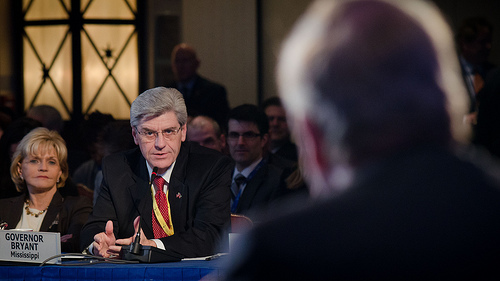Mississippi’s Phil Bryant is the latest Republican governor to pursue comprehensive education reforms. He recently released an agenda for expanding charter schools, introducing private school choice, holding students back if they can’t read in third grade, and improving teacher quality.
“Mississippi children are struggling,” Bryant said. “In the last legislative session, we focused on strengthening Mississippi’s business climate in order to spur job creation. This year, we must be serious about improving our education system.”
Nearly 80 percent of Mississippi’s fourth-grade students are not proficient in reading on state tests, one indicator among many putting the state at or near the bottom of education performance nationwide.
Tax-Credit Scholarships
A central part of Bryant’s plan is a tax-credit scholarship program to give students below the poverty level and attending schools the state rates D or F funding to attend any school their families choose. Bryant proposes allowing Mississippi taxpayers to deduct up to a collective $10 million in donations to nonprofits that, in turn, offer these children scholarships.
“I don’t see a reason to limit [school choice] just to students in failing schools,” said Jason Bedrick, a Cato Institute policy analyst. “Even the best schools in Mississippi aren’t that great [according to] nationwide [comparisons], and worldwide they are really bad. Even if you have a great school in Mississippi, it may not be great for 100 percent of the students in that school. That’s why you want choice.”
The money would allow about 2,200 scholarships per year. In neighboring Louisiana, approximately 380,000 students are eligible for state vouchers. Mississippi has approximately half a million K-12 students.
The proposals are “better than what [Mississippi students] have now, but it’s pretty weak tea,” Bedrick said.
‘Good Place to Start’
The governor’s office views a limited program as a “good place to start,” and the $10 million cap sits between other state ETCs, said Bryant’s spokesman, Mick Bullock.
“Mississippi has more children living in poverty than any other state,” Bullock said. “It is essential that those most in need benefit from the opportunity scholarship.”
A state constitutional amendment enacted during a time of national anti-religious fervor bars Mississippi, like 38 other states, from funding religious-affiliated organizations. This means a voucher system in which the state sends money directly to religious schools is legally impossible, but tax-credit scholarships are not, Bedrick said.
“Scholarship tax credits have a perfect record of being constitutional wherever they are challenged,” even in states with constitutional language close to Mississippi’s, he said.
Legislators who may not support expanding charter schools or some of the governor’s other ideas still cross the aisle to support tax credit scholarships, said Forest Thigpen, president of the Mississippi Center for Public Policy.
Charter School Paradox
States that open opportunities for charter schools should do so at the same time they expand opportunities for private school choice, Bedrick said, because otherwise charters reduce the amount of school choice available by “cannibalizing” students from private schools.
Bryant’s plan creates this “charter school paradox” because the private school choice it offers is so limited, Bedrick said.
Bullock welcomes charter schools because they could give children “yet another opportunity to succeed.”
“The governor believes competition is an innovative way of introducing new ideas to the classroom,” Bullock said. “He has seen firsthand the amazing results charter schools have on children and communities.”
Legislation Ahead
The governor’s office is currently working with legislators on bills that would pass his agenda into law, Bullock said. During that process, he said, the governor expects to refine his ideas “based on sound research and lessons learned from other states.”
Bryant and Mississippi Department of Education staff have met several times with staff from the Florida-based Foundation for Excellence in Education while considering the policy changes.
The governor also endorsed open enrollment, which would allow students to attend any public school in the state rather than being forced to attend the school their home is zoned into.
“This is the first time that statewide officials have been talking about broader aspects of school choice, so I am encouraged,” Thigpen said.
Image by USDA.gov.




